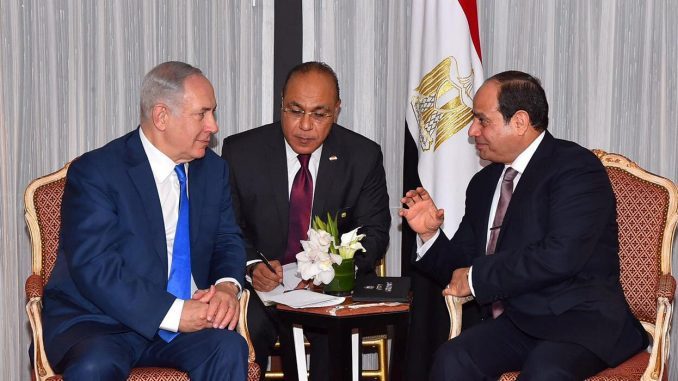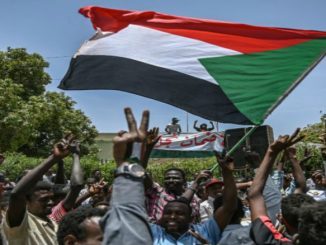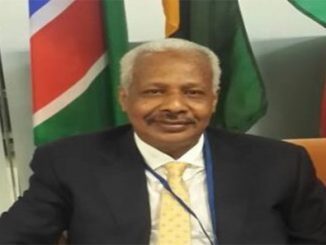
Egyptian intelligence chief Abbas Kamel on Wednesday met with the head of Israel’s Shin Bet security agency, Nadav Argaman, in Tel Aviv, Israeli media has reported.
Israel has charged the head of Egypt’s intelligence services, Gen. Abbas Kamel, with a message for Hamas, Israel’s military radio reported.
According to Israeli radio, Argaman told Kamel to warn the Gaza-based Hamas movement against “violating” Gaza’s border with Israel amid ongoing Palestinian protests in the coastal enclave.
“The army will not tolerate any attempt to approach or damage the [border] fence,” Argaman was quoted as saying.
Egypt has yet to issue any official statements regarding Wednesday’s meeting in Tel Aviv.
Since the demonstrations began in earnest last Friday, at least 17 Palestinians have been killed near the border by Israeli army gunfire.
In the run-up to the protests last week, Israel deployed thousands of troops along the border, vowing to use deadly force against anyone who threatened Israel’s “security infrastructure”.
Friday’s rallies kicked off a six-week protest that will culminate on May 15, which will mark the 70th anniversary of Israel’s establishment — an event Palestinians refer to as the “Nakba” or “Catastrophe”.
The “Great March of Return”
Yesterday, Palestinian activists chanted “death is better than humiliation” as three-wheelers stacked with old tires drove into a tent camp in a barley field near Gaza’s border. The tires are to be burned at a mass protest on Friday, in hopes clouds of black smoke will shield demonstrators from Israeli snipers.
For some of the young Gaza men hanging around the camp, the chant wasn’t just rousing hyperbole. They have been throwing stones and burning tires near the border in recent days, despite new warnings by Israel’s defense minister that anyone getting too close to the fence risks getting killed.
It’s not an idle threat — 19 people were killed by Israeli fire since last Friday, including 14 in border protests, and many more were wounded.
Nahed Qudih, a 17-year-old high school student, said he has nothing to lose by joining his peers in the seemingly futile and dangerous act of running toward armed soldiers who fire from behind a fence, some perched on high earthen berms providing cover.
“If I was wounded or became a martyr, my family would be proud,” he said.
Qudih’s family would like to see him realize his dream of becoming an engineer, but “not an idle engineer,” he said, referring to bleak job prospects amid rising Gaza unemployment, now at 48 percent, according to the Palestinian statistics bureau.
Such desperation has helped drive several weeks of border protests, with the largest crowds expected on Fridays.
The idea was initially floated by social media activists, but has since been co-opted by Hamas, and other factions.
Employing its organizational prowess, Hamas set up five tent camps near border points as a magnet for protesters, offering bus shuttles and monitoring developments from an operations room.
For Hamas, it’s perhaps the last chance to break a Gaza border blockade enforced by Israel and Egypt since seizing the territory from its rival, Palestinian President Mahmoud Abbas, in 2007.
The blockade has devastated Gaza’s economy, made it virtually impossible for people to enter and exit the territory and left residents with just a few hours of electricity a day. Tap water is undrinkable and the Mediterranean coastline has been polluted with untreated waste.
Other blockade-busting tactics by Hamas have failed over the years, including three cross-border wars with Israel and repeated rounds of unsuccessful power-sharing talks with the West Bank-based Abbas. The last round collapsed last month, in part because Hamas refused to disarm.
Hamas leaders have billed the final protest, set for May 15, as the “Great March of Return” of Palestinian refugees and their descendants.
Meeting Mahmoud Abbas
Previously, Palestinian Authority President Mahmoud Abbas received Kamel in the West Bank city of Ramallah, where the latter delivered a private letter to Abbas from Abdel Fattah al-Sisi.
Analysts say that Egypt has been putting considerable pressure on Abbas not to enact any new budget cuts, according to two Palestinian sources who spoke on condition of anonymity.
The Egyptians have been pressuring Abbas to refrain from imposing new sanctions on the Gaza Strip in response to the March 13 bombing of the convoy of Prime Minister Rami Hamdallah in the northern Gaza Strip.
Neither Hamdallah nor PA intelligence chief, Majed Faraj, who was part of the convoy, was hurt in the attack.
In a fiery speech last month, Mahmoud Abbas hinted that he was about to cut all budgets allocated to the Gaza Strip if the PA does not take full control of the coastal enclave.
Hamas has controlled Gaza since it ousted the Fatah-dominated PA from the territory in 2007.
Musa Abu Marzouk, a senior Hamas leader, earlier this week reportedly told Russian officials during a visit to Moscow that “Salafi” jihadists with links to a PA security agency in the West Bank were behind the attack.
In a phone call with Abbas on March 19, Abdel Fattah al-Sisi asked Abbas to hold off from implementing any new budget cuts and allow for Cairo’s General Intelligence Services to make additional efforts to advance reconciliation, both sources said.
Abbas reluctantly agreed to Sisi’s request, but demanded Hamas hand over full control of Gaza to the PA, both sources added.
“Al-Sisi recently warned Abbas not to take new measures that could aggravate the situation in the Gaza Strip, “said a PA official in Ramallah. “The Egyptians are worried that such measures will have disastrous repercussions on the Palestinians.”
Following the bombing of the convoy, Abbas vowed to take “Legal, financial and national” measures against Hamas, which he has repeatedly held responsible for the apparent assassination attempt. Abbas also threatened that “shoes would be pouring on the heads of the most junior and senior officials in Hamas.”
Last year, Abbas imposed a series of sanctions on the Gaza Strip that included suspending payments to thousands of civil servants and welfare assistance to hundreds of families. The measures also included the suspension of payments to Israel for electricity supplies to the Gaza Strip, which led to severe electricity shortages in the Strip.



